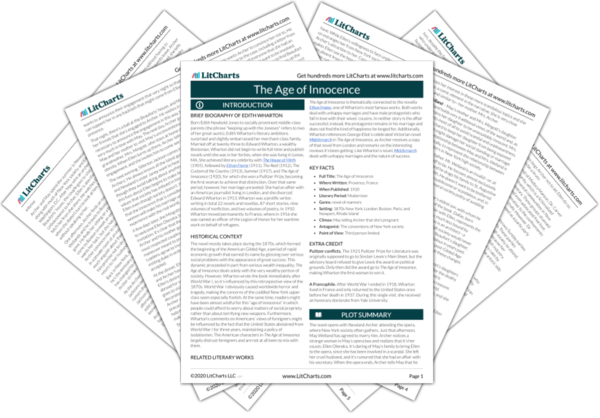Although Edith Wharton was American, she spent the majority of her last twenty-four years living in France, and The Age of Innocence presents a strong critique of the way Americans thought of Europeans prior to World War I. The New Yorkers in this book are generally quite suspicious of Europeans, who embody American fears about loose morals and cultural decadence. Americans think it’s a shame when their own people marry foreigners, they’re quick to judge Julius Beaufort because he’s British, and—even though Ellen Olenska grew up in New York—high society regards her as a foreigner since she’s lived abroad for so long.
Ellen does, in fact, act more like the American stereotype of a foreigner than like a typical New Yorker; she has more liberal ideas about the proper way of conducting one’s life, she hungers for good conversation about art and music, and she even constructs certain English phrases the way a French speaker would. If New York society hesitates to think well of foreigners, then Archer’s attraction to Ellen—essentially a foreigner—increases as he more deeply questions the mandates of New York society. Ellen’s foreignness means that she doesn’t inherently understand or respect New York the way that Archer does, and as Ellen unwittingly oversteps social boundaries, Archer becomes more aware that these boundaries are arbitrary and even damaging to the lives of New Yorkers. In a way, Ellen can be seen as an embodiment of the political impact of Europe around World War I (when the novel was written); she causes conflict in New York and challenges the status quo, but her perspective is necessary to progress.
No matter what the characters think, Wharton portrays Europe as a more artistic, intellectual place than New York, which, coming from a writer, is obviously a recommendation of the continent. Archer thinks that Ellen must find New York dull after the lively intellectual scene she’s used to in Europe, and when M. Rivière suggests that he might move to New York to find such a scene, Archer warns him that he won’t find what he’s looking for in New York. Indeed, unlike today’s New York, New York of the 1870s seems to be a cultural desert. The Metropolitan Museum of Art is spare in its treasures, and most of Archer’s circle doesn’t know or care enough to have discussions about literature and art. The artists and writers of New York live in an area considered almost slum-like by the upper class, and they’re looked down upon. In Europe, the upper classes invite artistic people to their gatherings as honored guests, but in New York, fashionable people shun Mrs. Struthers for holding parties that include artists and dancing.
Though New Yorkers travel in Europe relatively often, they seem to remain mentally and socially in New York as much as possible. Mrs. Archer and Janey focus on the landscape when they travel, avoiding exposure to such things as art and architecture that actually provide windows into foreign culture. They also avoid socializing with Europeans, feeling that looking up people to whom they have connections would be an improper imposition that would reflect badly on Americans in general. In fact, Mrs. Archer and Janey remain steadfastly isolated on their travels unless they run across someone whom they already know intimately from home.
Wharton seems to frown on the kind of cultural isolation she portrays, as it contributes to the New Yorkers’ closed-minded prejudices. She certainly doesn’t glorify foreigners—Beaufort and Ellen’s Polish husband are both scoundrels—but she does suggest that Americans might benefit from a closer connection with Europe. Wharton also criticizes New York’s lack of interest in art and literature. Significantly, this book was written just after World War I, which the United States hesitated to enter due to its isolationist policies. Wharton seems to argue in favor of the United States abandoning its sense of superiority and engaging more fully with the rest of the world. In fact, certain aspects of the book can be read as an allegory of foreign policy, in which the destructive social and cultural isolationism of New York demonstrates the foolishness of America attempting to remove itself from world affairs.
American vs. Foreign ThemeTracker

American vs. Foreign Quotes in The Age of Innocence
The Countess Olenska was the only young woman at the dinner; yet, as Archer scanned the smooth plump elderly faces between their diamond necklaces and towering ostrich feathers, they struck him as curiously immature compared with hers. It frightened him to think what must have gone to the making of her eyes.
No, it was worse a thousand times if, judging Beaufort, and probably despising him, she was yet drawn to him by all that gave him an advantage over the other men about her: his habit of two continents and two societies, his familiar association with artists and actors..., and his careless contempt for local prejudices.... [T]he circumstances of his life, and a certain native shrewdness, made him better worth talking to than many men, morally and socially his betters, whose horizon was bounded by the Battery and the Central Park. How should anyone coming from a wider world not feel the difference and be attracted by it?
In all the rainy desert of autumnal London there were only two people whom the Newland Archers knew; and these two they had sedulously avoided, in conformity with the old New York tradition that it was not “dignified” to force oneself on the notice of one’s acquaintances in foreign countries.
Mrs. Archer and Janey... had so unflinchingly lived up to this principle... that they had almost achieved the record of never having exchanged a word with a “foreigner” other than those employed in hotels and railway-stations.











